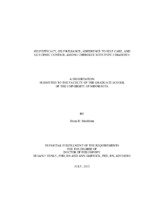Self efficacy, self reliance, adherence to self care, and glycemic control among Cherokee with type 2 diabetes
View File(s)
- Author(s)
- Details
-
Dr. Diana D. Mashburn, PhD, RN-BC, CNE
- Sigma Affiliation
- Zeta Chi at-Large
Visitor Statistics
Visits vs Downloads
Visitors - World Map
Top Visiting Countries
| Country | Visits |
|---|
Top Visiting Cities
| City | Visits |
|---|
Visits (last 6 months)
Downloads (last 6 months)
Popular Works for Mashburn, Diana D. by View
| Title | Page Views |
|---|
Popular Works for Mashburn, Diana D. by Download
| Title | Downloads |
|---|
View Citations
Citations
Background: Type 2 diabetes is responsible for disability and shortened life span among Native Americans. Adherence to recommendations for diet, exercise and medication is essential to optimizing outcomes. Few studies of self care have included Native American participants.
Specific Aims: Among Cherokee adults, aims are to (a) describe self efficacy, Cherokee self reliance, adherence to self care recommendations and glycemic control; (b) explore the relationship between self efficacy and Cherokee self reliance; and (c) predict glycemic control from self efficacy, Cherokee self reliance, adherence to self care recommendations, and personal characteristics.
Methods: The design was observational and cross-sectional. A convenience sample of 164 female and 136 male Cherokee adults with type 2 diabetes receiving care at three Cherokee Nation clinics participated. Subjects completed the Diabetes Self Efficacy Scale, Cherokee Self Reliance Questionnaire, and Summary of Diabetes Self Care Activities. Glycemic control was indexed using the most recent A1C value.
Results: The average age of participants was 58.29 ( SD = 12.07); they had had type 2 diabetes for an average of 9.06 years (SD = 7.85). Using exploratory maximum likelihood factor analysis with orthogonal rotation, items from self efficacy and self reliance measures loaded on separate factors. Self efficacy, years since diagnosis, age and clinic (C compared with B) were significant predictors of A1C.
Conclusions: Glycemic control was only partly explained. Diabetes self care is complex. Continued research on psychosocial and educational aspects of self care is needed to better understand diabetes management and outcomes among Cherokee adults.
This dissertation has also been disseminated through the ProQuest Dissertations and Theses database. Dissertation/thesis number: 3523007; ProQuest document ID: 1040867215. The author still retains copyright.
This item has not gone through this repository's peer-review process, but has been accepted by the indicated university or college in partial fulfillment of the requirements for the specified degree.
| Type | Dissertation |
| Acquisition | Proxy-submission |
| Review Type | None: Degree-based Submission |
| Format | Text-based Document |
| Evidence Level | Descriptive/Correlational |
| Research Approach | Qualitative Research |
| Keywords | Patient Education; Blood Sugars; Chronic Illness |
| CINAHL Subject(s) | Diabetes Mellitus, Type 2; Glycemic Control; Native Americans; Patient Compliance; Self Care; Self-Efficacy |
| Grantor | University of Minnesota |
| Advisor | Henly, Susan J.; Garwick, Ann |
| Level | PhD |
| Year | 2012 |
All rights reserved by the author(s) and/or publisher(s) listed in this item record unless relinquished in whole or part by a rights notation or a Creative Commons License present in this item record.
All permission requests should be directed accordingly and not to the Sigma Repository.
All submitting authors or publishers have affirmed that when using material in their work where they do not own copyright, they have obtained permission of the copyright holder prior to submission and the rights holder has been acknowledged as necessary.
Related items
Showing items related by title, author, creator and subjects.
-
American Association of Diabetes Educators 7 intervention in managing type 2 diabetes in older home health patients
Ohakosim, Anne N.Management of chronic disease pathologies requires the patient to have the ability to understand and manage their care. This may be especially challenging in the aging population caring for themselves at home. The home ... -
Enhancing self-efficacy among patients with Type 2 diabetes and cardiovascular diseases by health promotion
Bordas, ElisangelaBackground: A significant number of individuals across the United States and the world are afflicted by diabetes mellitus and cardiovascular diseases at the same time. The rising prevalence of co-existing diseases ... -
Gender differences in self-care behaviors in persons with type 2 diabetes
Cameron, Allison; Sethares, Kristen A.; Hojjat, Mahzad; Moyer, Anne; Batty, Kristine (2017-10-25)Guided by the middle-range Theory of Self-Care in Chronic Illness, this poster will describe research conducted to describe gender differences in self-care behaviors of persons with type 2 diabetes. -
The effectiveness of a promotora-led intervention for Mexican Americans with type 2 diabetes
Lujan, JosefinaPurpose. The purpose of this randomized control repeated measures trial was to determine the effectiveness of a self-management intervention led by community lay workers called promotoras on the health outcomes of Mexican ... -
Preventing Type 2 diabetes in Native Americans through nutrition
Griffin, Dana M.; Sansom, DorothyDiabetes is a chronic condition that disproportionately affects the Native American population. A means of improving the outcomes was through an education program aimed at a younger target population. The purpose of this ...





